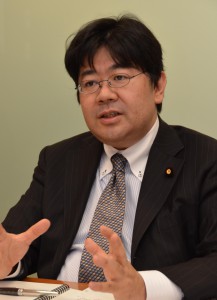 Q. Agriculture is facing an important phase both domestically and internationally.
Q. Agriculture is facing an important phase both domestically and internationally.
A. Your Party is basically supporting the Trans-Pacific Partnership free-trade talks. All the parties should make their stances clear, whether they are for or against the scheme, in order to discuss the issue. If the government is going to reduce tariffs, we also have to discuss how to cope with the adverse effects of tariff reductions. Farmers are the ones who will be influenced by the outcomes. The government must disclose necessary information as soon as possible so that we can discuss the directions we are heading for.
Domestically, the government began talking about revising the rice production adjustment system and reforming the Japan Agricultural Cooperatives. The two issues represent a major policy shift. The government has been adjusting rice production to avoid price drops, but we believe the prices should be decided by the market. The government should abolish the rice production adjustment system and instead offer income compensation mainly to large-scale farmers if necessary.
Q. How should JA be reformed?
A. The most important point is how JA will be involved in farmers’ efforts to start processing and sales business. We fear that JA would monopolize distribution of agricultural products if the system remains as it is. While the national production value of agricultural products is JPY9.4 trillion, farmers’ incomes remains at JPY3 trillion. Market for processed agricultural food products is as large as JPY73 trillion, and it is important to think of ways to allow farmers to take more of the market.
JA’s has an important task as a cooperative, but it has actually become a financial institution. We believe that financial business should be separated from JA.
Q. JA has been improving services for its members through offering a comprehensive set of businesses.
A. As a comprehensive agricultural organization, JA should make profits from sales business. Be it financial business or sales business, the quality of its services will not improve unless it puts itself in severe market competition.
Q. What will you focus on in discussing the new basic plan for food, agriculture and rural areas?
A. The problem with the Ministry of Agriculture, Forestry and Fisheries’ agricultural policies is that its goal is set on improving the food self-sufficiency rate. The basic plan is distorted because it is aimed at raising the calorie-based self-sufficiency rate. Even if farmers produce high value-added vegetables, it will not be appreciated under the plan because the products are low in calories. Speaking from an overall point of view, I think the right choice is to expand the size of the food market.
Interviewed by Kenji Okada
(Jan. 31, 2014)

